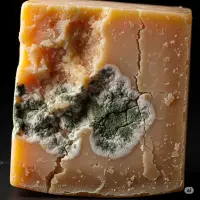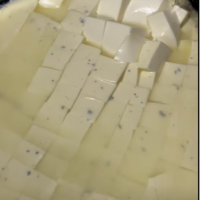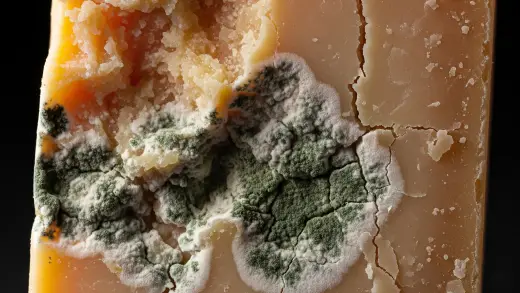Kraft Parmesan Cheese is made in the United States, specifically in Austin, Texas.
The Tale Of Kraft Parmesan
Kraft Parmesan cheese originates from Austin, Texas, United States. The cheese is crafted with precision at a dairy in Mantova, Italy, using half a ton of milk for each block, then shaped, bathed in salt, and ripened in a specialized room before reaching consumers’ tables.
Cheese Culture: Kraft’s Secret Ingredient
For over a century, Kraft Parmesan cheese has been a staple in households worldwide. Crafted from high-quality ingredients, it embodies a rich cheese culture that has been carefully cultivated to create the perfect flavor profile.
Kraft’s secret ingredient lies in its commitment to traditional cheese-making methods, ensuring that each bite delivers an authentic and delightful experience.
From Milk To Shaker: Production Process
The journey of Kraft Parmesan cheese begins with the finest milk sourced from trusted dairy farms. The milk undergoes a meticulous process of solidification and shaping, leading to the formation of the iconic cheese blocks.
After shaping, the cheeses are immersed in a rejuvenating salt bath, enriching them with distinctive flavors. Following this, they are carefully aged in the ripening room, where they undergo a transformative process, resulting in the perfect texture and taste.

Credit: www.amazon.com
Geographic Cheese Journey
When we think of Parmesan cheese, we often associate it with the rich culinary traditions of Italy. However, the journey of Kraft Parmesan cheese takes us across the Atlantic to the heart of America. Let’s explore the geographic origins of this beloved cheese and the heritage it carries from both Italy and the United States.
Italian Roots: Parmigiano Reggiano’s Legacy
Parmigiano Reggiano cheese, commonly known as Parmesan, has deep roots in the Emilia-Romagna region of Italy. This renowned cheese is crafted in a strictly defined area comprising Parma, Reggio Emilia, Modena, and parts of Mantua and Bologna. The production of Parmigiano Reggiano follows centuries-old traditions, with strict regulations ensuring its authenticity and quality.
Made In America: The Wisconsin Connection
The story of Kraft Parmesan cheese brings us to the dairy heartland of the United States, specifically to Wisconsin. Known for its cheese-making expertise, Wisconsin plays a pivotal role in the production of Kraft Parmesan cheese. The state’s dairy farms and cheese-making facilities contribute to the creation of this iconic cheese, upholding its legacy in American culinary culture.
Debunking Cheese Myths
Kraft Parmesan Cheese comes from Austin, Texas, United States, known for its authentic production process. Contrary to myths, it is not sourced exclusively from Italy, showcasing the global reach of quality cheese production.
When it comes to Kraft Parmesan Cheese, there are often misconceptions and myths surrounding its ingredients and production process. In this section, we will debunk some of these myths to provide you with accurate information about the cheese you love.
The Wood Pulp Controversy
One common myth that has circulated is the presence of wood pulp in Kraft Parmesan Cheese. However, this is not true. The controversy arose from a misinterpretation of an FDA regulation that allows the use of cellulose as an anti-caking agent in grated cheese products.
Code of Federal Regulations:
| Section | Subsection | Paragraph | Text |
|---|---|---|---|
| 21 CFR | 133.123 | (c) | Cellulose powder, powdered cellulose, and cellulose microcrystalline are used in amounts not to exceed 2 percent. |
Cellulose, derived from plant sources, is a common food additive used to prevent clumping and improve texture. It is safe for consumption and does not affect the taste or quality of the cheese. So rest assured, there is no wood pulp in Kraft Parmesan Cheese.
Truth About Animal Rennet In Kraft Cheese
Another myth surrounding Kraft Parmesan Cheese is the use of animal rennet in its production. Rennet is an enzyme traditionally derived from the stomach lining of young calves and is used to coagulate milk during cheese-making.
However, Kraft Grated Parmesan Cheese uses microbial rennet, which is a vegetarian-friendly alternative. While it may occasionally contain lipase, an enzyme that can be derived from animals, it is not a standard ingredient in the cheese. To ensure that the cheese is suitable for vegetarians, always check the label for the presence of lipase.
By debunking these cheese myths, we hope to provide you with accurate information about Kraft Parmesan Cheese. It is made with high-quality ingredients and adheres to strict production guidelines to deliver the delicious taste you know and love.
Taste Test: Kraft Versus Authentic
Discover the origins of Kraft Parmesan Cheese – a product of Austin, Texas, United States. Uncover the process behind the green bottle’s distinct flavor compared to authentic Parmesan.
The Flavor Face-off
When it comes to Parmesan cheese, there’s often a debate between Kraft and authentic varieties. Many people wonder if the convenient and widely available Kraft Parmesan cheese can truly compare to the real deal. Let’s dive into a taste test between Kraft and authentic Parmesan cheese to see how they stack up against each other.
Shelf-stable Vs. Fresh: A Sensory Comparison
One of the key differences between Kraft Parmesan cheese and its authentic counterpart lies in their shelf stability. Kraft Parmesan cheese, packaged in a green bottle, is known for its long shelf life and ability to withstand pantry storage for extended periods. On the other hand, authentic Parmesan cheese, such as Parmigiano Reggiano, is typically sold in blocks or wedges and needs refrigeration to maintain its freshness.
But what about the taste? Does the shelf stability of Kraft Parmesan cheese affect its flavor? Let’s find out.
Taste Test Results:
| Kraft Parmesan Cheese | Authentic Parmesan Cheese |
|---|---|
| Convenient and accessible | Rich and complex flavor |
| Milder taste | Intense and nutty flavor |
| Uniform texture | Crumbly and granular texture |
As seen in the taste test results, Kraft Parmesan cheese offers convenience and accessibility, making it a popular choice for many households. However, when it comes to flavor, authentic Parmesan cheese shines with its rich, complex taste and intense nutty notes. The texture of authentic Parmesan cheese is also different, with a crumbly and granular feel that adds a delightful mouthfeel to dishes.
So, while Kraft Parmesan cheese serves its purpose as a convenient and shelf-stable option, those who seek the authentic Italian experience may prefer to opt for the real thing. The choice ultimately depends on individual preferences and the desired flavor profile for your culinary creations.
Legal Cheese Lines
Craft Parmesan Cheese originates from Parma and Reggio in Italy’s Emilia-Romagna region. Known for its strict production guidelines, Parmesan cheese is synonymous with Parmigiano Reggiano, ensuring authenticity and quality in each savory bite.
Name Game: Parmesan Or Parmigiano Reggiano?
When it comes to the world of cheese, names matter. And the name Parmigiano Reggiano is one of the most important names in the cheese world. This name refers to a specific type of hard cheese that is produced in a specific region of Italy. In fact, the name is protected by both European Union and United States laws, which means that only cheese produced in the Parma and Reggio regions of Italy can be called Parmigiano Reggiano. However, many other types of cheese, including Kraft Parmesan Cheese, are often referred to as Parmesan.International Cheese Laws And Kraft
Kraft Parmesan Cheese is produced by Kraft Foods Group, Inc., which is based in Northfield, Illinois. While the cheese is sold under the name Parmesan, it is not actually produced in Italy. Instead, it is made in the United States using milk from cows that are raised on farms in the Midwest. One of the reasons that Kraft is able to produce Parmesan cheese in the United States is that there are no international laws that govern the use of the name Parmesan. While the name Parmigiano Reggiano is protected, the name Parmesan is not. This means that any cheese producer can use the name Parmesan, even if the cheese is not produced in Italy. Despite the lack of international laws governing the use of the name Parmesan, there are still legal guidelines that cheese producers must follow when producing and labeling their products. In the United States, the Food and Drug Administration (FDA) sets guidelines for the production and labeling of cheese products. One of the most important guidelines is the use of the term “Grated Parmesan Cheese.” According to the FDA, in order for a cheese product to be labeled as Grated Parmesan Cheese, it must contain at least 91% Parmesan cheese. The remaining 9% can be made up of other ingredients, such as salt and cellulose. While there has been some controversy in recent years about the use of cellulose in grated Parmesan cheese products, it is important to note that cellulose is a natural product that is derived from plants. It is often added to grated cheese products to prevent clumping and improve texture. In conclusion, while Kraft Parmesan Cheese may not be produced in Italy, it is still subject to legal guidelines and regulations in the United States. And while the name Parmesan may not carry the same weight as Parmigiano Reggiano, it is still an important name in the world of cheese.:max_bytes(150000):strip_icc()/ar-kraft-parmesan-cheese-kraft-4x3-c59082cc061b417a8c80cc455f62d259.jpg)
Credit: www.allrecipes.com

Credit: discover.texasrealfood.com
Frequently Asked Questions
What Is Kraft Parmesan Cheese Made From?
Kraft parmesan cheese is made from pasteurized cow’s milk, enzymes, salt, and cellulose powder (to prevent caking). It is produced at the Kraft plant in Wausau, Wisconsin, USA. While it may not be authentic Parmigiano Reggiano from Italy, it still has a delicious and distinct flavor that many people enjoy.
Where Does The Us Get Parmesan Cheese From?
Parmesan cheese in the US is primarily sourced from Italy, specifically from the historical regions of Parma and Reggio in Emilia-Romagna. These regions have strict production guidelines for Parmigiano Reggiano cheese, which is the authentic and protected name for Parmesan cheese.
Does Kraft Grated Parmesan Cheese Have Animal Rennet?
Yes, Kraft grated Parmesan cheese uses microbial rennet, but it may occasionally contain animal-derived lipase. To ensure suitability for vegetarians, check the label for the presence of “lipase”.
Is All Parmesan Cheese Made In Italy?
Not all Parmesan cheese is made in Italy. Parmigiano Reggiano is protected and can only be produced in specific regions of Italy.
Where Is Kraft Parmesan Cheese Made?
Kraft Parmesan cheese is made in the United States, primarily at the Kraft plant in Wausau, Wisconsin.
Conclusion
Kraft Parmesan cheese comes from a blend of American and imported cheeses, with the Parmesan cheese being imported from Italy. The cheese is made using traditional methods, including the use of microbial rennet and cellulose as an anti-caking agent. While there have been concerns about the quality and authenticity of Parmesan cheese in the US, Kraft has assured its customers of the quality and safety of their product.
So, next time you sprinkle some Kraft Parmesan on your pasta, you can rest assured that it comes from a carefully crafted blend of high-quality cheeses.














